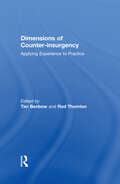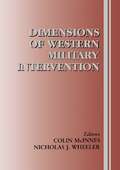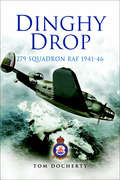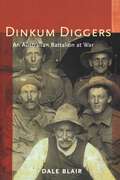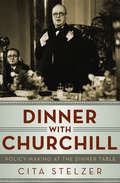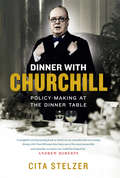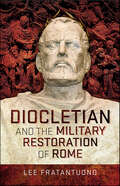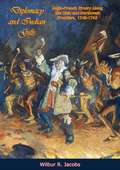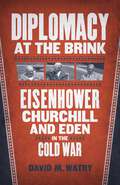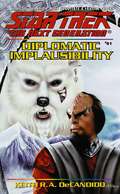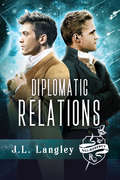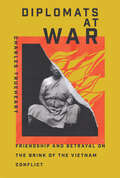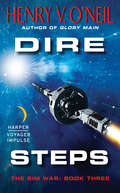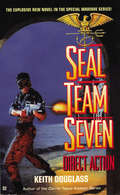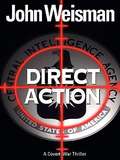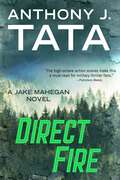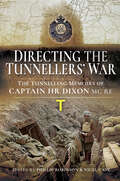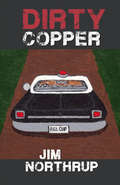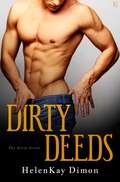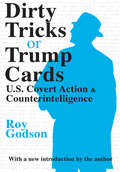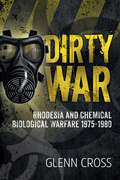- Table View
- List View
Dimensions of Counter-insurgency: Applying Experience to Practice
by Tim Benbow and Rod ThorntonThe once-neglected study of counter-insurgency operations has recently emerged as an area of central concern for Western governments and their military organizations. While counter-insurgency represents a hugely challenging form of contemporary warfare, there exists a considerable body of experience that offers assistance in the form of examples of
Dimensions of Western Military Intervention
by Nicholas J. Wheeler Colin McINNESMilitary intervention to protect civilians in danger has emerged as a key challenge for the West. This book explores the West's reaction to these challenges and some of the limits on its actions.
Dinghy Drop: 279 Squadron RAF, 1941–46
by Tom DochertySeptember 1941 approval was given for the formation of two long-range Air-Sea Rescue squadrons. No 279 Squadron was formed at Bircham Newton in Norfolk. In the period leading up to the formation of the squadron there had been much work done in relation to air-dropped survival equipment such as the Lindholme Dinghy Dropping Gear, the Bircham Barrel and the Thornaby Bag. These contained such items as water, food, first-aid kits and distress signals. 279 was the first squadron to employ the airborne lifeboat, which was carried beneath the bellies of the portly Hudson. In January 1942 a practical boat, fitted with oars, sails and engines was put into production with the intention of slinging it under the bomb bay of the Hudson and to drop it by parachute. In October 1944 the Squadron re-equipped with Warwick Mk I aircraft moved to Thornaby in the NE of England. By now its ASR net was cast wide and there were detachments at Tain, Fraserburgh, Wick and Banff (all in northern Scotland) and Reykjavik.
Dinkum Diggers: An Australian Battalion at War
by Dale James BlairTall, sun-bronzed, hardy. Resourceful, independent, egalitarian. Scornful of authority, loyal to their mates. These mythical characteristics of the Anzac 'diggers' are central to our idea of what it is to be Australian. But did the soldiers themselves fit the stereotype? How closely does the myth match the reality? This penetrating study strips away celebratory generalisations and measures the Anzac legend against the actual experiences of one battalion that fought at Gallipoli and on the Western Front in World War I. The diaries and letters written by soldiers of the 1st Battalion reveal attitudes, insights, comments and criticisms that qualify and even contradict the Anzac legend. In Dinkum Diggers, Dale James Blair compares these first-hand accounts by front-line infantrymen with unit diaries, operational records, service and repatriation records, as well as with interviews with family members and statistical analysis, to present a well-rounded picture of the complexities of the 1st Battalion's experience. By narrowing the focus of Australian war experience to a single battalion, he demonstrates nuances and subtleties, showing how the men viewed and reacted to their own officers and how both officers and men behaved in combat. He follows these war-damaged soldiers into civilian life, where they mostly kept quiet as conservative forces worked to enshrine and sanitise Australia's sacrifice. This book makes a notable contribution to revisionist studies about World War I. It is a patient, thorough and scholarly demolition job on the Anzac legend, a reality check on back-slapping triumphalism and the glorification of war.
Dinner with Churchill: Policy-Making at the Dinner Table
by Cita StelzerA colorful and eloquent look at Churchill, with fascinating new insights into the food he ate, the Champagne he loved, and the important guests he charmed. This delectable volume is a sumptuous and intellectual treat.A friend once said of Churchill: "He is a man of simple tastes; he is quite easily satisfied with the best of everything." But dinners for Churchill were about more than good food, excellent champagnes and Havana cigars."Everything" included the opportunity to use the dinner table both as a stage on which to display his brilliant conversational talents, and an intimate setting in which to glean gossip and diplomatic insights and to argue for the many policies he espoused over a long life. In this riveting, informative and entertaining book, Stelzer draws on previously untapped material, diaries of guests, and a wide variety of other sources to tell of some of the key dinners at which Churchill presided before, during and after World War II.
Dinner with Churchill: Policy-Making at the Dinner Table
by Cita Stelzer"A delightful and delicious tribute to Churchill's heroic appetite for wining, dining and politicking" - Ben Macintyre, author of Operation Mincemeat. A friend once said of Churchill "He is a man of simple tastes; he is quite easily satisfied with the best of everything." But dinners for Churchill were about more than good food, excellent champagnes and Havana cigars. "Everything" included the opportunity to use the dinner table both as a stage on which to display his brilliant conversational talents, and an intimate setting in which to glean gossip and diplomatic insights, and to argue for the many policies he espoused over a long life. In this riveting, informative and entertaining book Cita Stelzer draws on previously untapped archival material, diaries of guests, and a wide variety of other sources to tell of some of the key dinners at which Churchill presided before, during and after World War II - including the important conferences at which he used his considerable skills to attempt to persuade his allies, Franklin Roosevelt and Joseph Stalin, to fight the war according to his strategic vision. With fascinating new insights into the food he ate, the champagnes he loved, as well as original menus, seating plans and unpublished photographs, Dinner with Churchill is a sumptuous treat. The next best thing to being there yourself.
Dinner with Churchill: Policy-Making at the Dinner Table
by Cita Stelzer"A delightful and delicious tribute to Churchill's heroic appetite for wining, dining and politicking" - Ben Macintyre, author of Operation Mincemeat. A friend once said of Churchill "He is a man of simple tastes; he is quite easily satisfied with the best of everything." But dinners for Churchill were about more than good food, excellent champagnes and Havana cigars. "Everything" included the opportunity to use the dinner table both as a stage on which to display his brilliant conversational talents, and an intimate setting in which to glean gossip and diplomatic insights, and to argue for the many policies he espoused over a long life. In this riveting, informative and entertaining book Cita Stelzer draws on previously untapped archival material, diaries of guests, and a wide variety of other sources to tell of some of the key dinners at which Churchill presided before, during and after World War II - including the important conferences at which he used his considerable skills to attempt to persuade his allies, Franklin Roosevelt and Joseph Stalin, to fight the war according to his strategic vision. With fascinating new insights into the food he ate, the champagnes he loved, as well as original menus, seating plans and unpublished photographs, Dinner with Churchill is a sumptuous treat. The next best thing to being there yourself.
Diocletian and the Military Restoration of Rome
by Lee FratantuonoThe third century AD was one of unprecedented crisis and chaos for the Roman Empire. Nightmares both internal and external threatened to spell the end of Rome’s thousand-year history. Diocletian was born either a slave or a freedman, and he grew up to become the savior of Rome in her hour of crisis, a powerful military and political leader who transformed the Roman Empire from a hotbed of unceasing strife and turmoil into a renewed, restored, revivified and stable polity. His more than twenty years of power were marked by the ill-fated Great Persecution of the Christians, an undertaking that would prove to be one of the less successful initiatives of his reign, even as in its own way it helped to pave the way for the coming of an equally famous, successful emperor in the person of Constantine the Great. The present study seeks to provide an introduction to the life and times of Diocletian for the general reader, offering a balanced portrait of an immensely talented man in a time of trial and tumult, an accomplished emperor who knew when it was time to retire to his gardens.
Diplomacy and Indian Gifts: Anglo-French Rivalry Along the Ohio and Northwest Frontiers, 1748-1763 (Eastern Woodlands History And Culture Ser.)
by Wilbur R. JacobsThis study of gifts to the Indians is an attempt to illuminate a hitherto almost obscure factor in the Colonial westward movement. These “presents,” comprising such eighteenth-century items as fabrics, hardware, munitions, food, toys, jewelry, clothing, wampum, and liquors, were a potent factor in the complex diplomatic history of Indian politics along the old Northwest frontier. Thousands of pounds sterling were expended both by the French and by the English in observing this old Indian custom that was so necessary to Indian diplomacy. Indeed, the civilizing influence of this concomitant of Western culture reached ahead of the fur trade far into the wilderness to the Mississippi Valley. These so-called presents also served as a measure of compensation for the vast areas of virgin forest that were bought by the English. The French competed with the British in securing the friendship of the powerful Indian confederacies, which, even as late as 1750, held the balance of power in North America. During the years 1748-1763, it became the policy of the colonies bordering the Ohio and Northwest frontiers to “brighten the chain of friendship” by giving presents to such influential “nations” as the members of the Iroquoian confederacy. Moreover, in some cases the Indians became so accustomed to these frequent outlays of free merchandise that they came to be almost completely dependent upon European goods.—Wilbur R. Jacobs
Diplomacy at the Brink: Eisenhower, Churchill, and Eden in the Cold War
by David M. WatryA groundbreaking new study of Anglo-American relations during the Cold War, Diplomacy at the Brink argues for a reevaluation of Dwight D. Eisenhower's foreign policy toward allies and enemies alike. Contrary to his reputation as a level-headed moderate, the Eisenhower who emerges in David M. Watry's exhaustively researched book is a conservative ideologue, a leader whose aggressively anti-Communist and anticolonialist foreign policies represented a major shift away from the containment policy of the Truman presidency. Watry contends that Eisenhower worked closely with John Foster Dulles to engage in aggressive brinksmanship that diametrically opposed Winston Churchill's diplomacy of "peaceful coexistence." At a time when British economic interests favored cooperation with China, Eisenhower planned nuclear war against it; when Anthony Eden considered Gamal Abdel Nasser a Soviet agent and invaded Egypt, Eisenhower supported Arab nationalism and used economic and political blackmail to force Britain to withdraw. Such stances fractured the "special relationship" between America and Great Britain and played a vital role in the dissolution of the British Empire. Watry's thorough examination of the important clash of U.S.-U.K. foreign policy demonstrates that America's new anti-colonial policies and the unilateral use of American power against perceived Communist threats put Eisenhower and Dulles on a collision course with Churchill and Eden that rocked the world.
Diplomatic Counterinsurgency
by Philippe Leroux-MartinWar does not stop when the armed conflict ends. This compelling eyewitness account of a key political crisis in Bosnia and Herzegovina in 2007 demonstrates how interventions from foreign powers to end armed conflict can create new forms of conflict that are not only as determined and resilient, but can lead groups to challenge the power of fragile states through political and legal means. Countering such challenges is an integral but often ignored part of peace processes. How do these nonviolent wars evolve? How can the power of fragile states be challenged through nonviolent means in the aftermath of armed conflict? And what is the role of diplomacy in countering such challenges? This book offers key insights for policy makers dealing with fragile states who seek answers to such questions.
Diplomatic Implausibility (Star Trek: The Next Generation #61)
by Keith R. DeCandido200 YEARS AGO: The expanding Klingon Empire found a frozen world rich in deposits of the mineral topaline. They named the planet taD -- Klingon for "frozen" -- and they called the people jeghpu'wI' -- conquered. FOUR YEARS AGO: The Klingon Empire invaded Cardassia, breaching the Khitomer Accords and causing a break with the Federation. On taD, depleted Klingon forces were overthrown in a small coup d'état, and the victorious rebels took advantage of the disruption to appeal for recognition from the Federation. NOW: The Klingons have returned to taD and re-established their control. But the stubborn rebels insist on Federation recognition. A solution to the diplomatic impasse must be found, a task that falls to the Federation's new ambassador to the Klingon Empire -- Worf. Worf thinks of himself as a fighter, not a negotiator, but the Federation disagrees. Now, for the sake of the Federation and the Empire, a Klingon warrior must weave a fragile peace out of a situation ripe for war!
Diplomatic Relations (The Sci-Regency Series #4)
by J. L. LangleyA Sci-Regency Novel: sequel to My Regelence RakeOpposites don’t just attract... they sizzle. A lusty special forces soldier who lives by his own set of rules, Dalton Fairfax decided long ago to stop wishing for his father’s love, and he found his calling. Now that he’s back home and between assignments, he finds himself at loose ends. When the opportunity arises to play bodyguard and help out his country, Dalton jumps at the chance. Not only does it keep him busy, but it just so happens that his charge is the man he saw on leave last month and hasn’t been able to get out of his head. Heir to a dukedom and a conservative politician, Blaise Thompson strives to prove himself worthy of carrying on the family legacy as the next IN Councilman. However, his closest competitor keeps getting in the way and taking credit for Blaise’s ideas. Maintaining his stellar reputation isn’t easy to do while keeping his outrageous younger brother in line and foiling his rival’s personal attacks. He has no time for a guard and even less time for romance. When a priceless antique goes missing, Blaise and Dalton discover that Regelance has larger problems than just IN plots. Now the only way to stop a scandal that threatens both of them is to compromise, and they are forced to confront the risk of losing everything… even each other.
Diplomats at War: Friendship and Betrayal on the Brink of the Vietnam Conflict (Miller Center Studies on the Presidency)
by Charles TrueheartFor two Americans in Saigon in 1963, the personal and the political combine to spark the drama of a lifetime Before it spread into a tragic war that defined a generation, the conflict in Vietnam smoldered as a guerrilla insurgency and a diplomatic nightmare. Into this volatile country stepped Frederick &“Fritz&” Nolting, the US ambassador, and his second-in-command, William &“Bill&” Trueheart, immortalized in David Halberstam&’s landmark work The Best and the Brightest and accidental players in a pivotal juncture in modern US history.Diplomats at War is a personal memoir by former Washington Post reporter Charles Trueheart—Bill&’s son and Nolting&’s godson—who grew up amid the events that traumatized two families and an entire nation. The book embeds the reader at the US embassy and dissects the fateful rift between Nolting and Trueheart over their divergent assessments of the South Vietnamese regime under Ngo Dinh Diem, who would ultimately be assassinated in a coup backed by the United States. Charles Trueheart retells the story of the United States&’ headlong plunge into war from an entirely new vantage point—that of a son piecing together how his father and godfather participated in, and were deeply damaged by, this historic flashpoint. Their critical rupture, which also destroyed their close friendship, served as a dramatic preface to the United States&’ disastrous involvement in the Vietnam conflict.Winner of the American Academy of Diplomacy Douglas Dillon Award
Dire Steps
by Henry V. O'NeilThe third installment in the action-packed Sim War seriesThe Step, a faster-than-light method of travel, is humanity's greatest advantage in its interstellar war with the Sims. Olech Mortas, Chairman of the Emergency Senate, believes the Step could be used to contact an alien entity that might tip the scales in the conflict. And he's willing to risk his life to prove it.Olech's son, Lieutenant Jander Mortas, has recently survived his first battle as part of the elite Orphan Brigade. The Orphans' new mission is to investigate suspicious Sim activity on the jungle planet Verdur--but what they discover there is far worse than anything they could have imagined.Meanwhile, Jander's sister Ayliss has gone to the war zone as the governor of a new colony made up of discharged veterans. Ayliss soon realizes that she and the colonists stand in the way of both the Sim enemy and a sinister mining corporation with powerful allies.All three members of the Mortas family are about to step into dire situations.
Direct Action (Seal Team Seven #4)
by Keith DouglassThird Platoon of SEAL Team Seven is assigned to plan and execute a mission intended to destroy a factory in Lebanon that is producing counterfeit U.S. hundred-dollar bills. After almost two months of planning and rehearsal, the mission goes relatively smoothly until it is time for extraction, when the raiders learn that they must spend an entire day in Lebanon, being hunted by what seems to them like the entire Syrian military while their extraction team dodges a Russian spy ship. It will take every bit of their SEAL training to survive.
Direct Action: A Covert War Thriller
by John WeismanIn the era of the Cold War, America had a ruthless and efficient intelligence gathering network entrusted with guarding the nation from outside threats. That was then . . . Tom Stafford is an independent contractor -- a former CIA case officer doing outsourced intelligence work for an agency stripped of its assets and power and rendered impotent. An anonymous "shadow warrior," he must now slip below the radar to uncover, target, and neutralize a bombmaker tied to the world's most feared terrorist organization before the assassin launches multiple deadly attacks against the U.S. and the West. At the same time, Stafford must mount a clandestine war against the Company itself -- because, for some mysterious, seemingly inexplicable reason, the people at the very top of the Central Intelligence Agency want him to fail . . .
Direct Fire (A Jake Mahegan Thriller #4)
by Anthony J. Tata&“The high-octane action scenes make this a must-read for military thriller fans&”—from the national bestselling author of Besieged (Publishers Weekly).Direct Fire brings the war on terror to America. A powerful banker, gunned down in cold blood. A military family, senselessly slaughtered as they sleep. A key general, kidnapped from his farm near Fort Bragg. Atrocities like these are all too common in the Middle East. But this is the United States of America . . . Time is running out for Jake Mahegan. Terrorist cells are gathering in the Blue Ridge Mountains. Hackers are emptying the nation&’s banks. And their final act of vengeance will bring the whole world to its knees. For Mahegan, it&’s time to kill. Now. &“Horrific at times, spine-tingling throughout, A. J. Tata once again proves capable of writing a firestorm that&’s even scarier because it is all too real.&” —Suspense Magazine Praise for the Jake Mahegan series from #1 New York Times-bestselling authors &“Tata&’s books are absolute rollercoaster rides . . . fun and fascinating reads.&” —Mark Greaney &“Tata writes with a gripping and gritty authority.&” —Richard North Patterson &“Absolutely fantastic . . . pulse-pounding.&” —Brad Thor &“An explosive, seat of your pants thriller!&” —W.E.B. Griffin &“Topical, frightening, possible, and riveting.&” —James Rollins
Directed Evolution for Development and Production of Bioactive Agents
by Daniel TalmageIn 2012, the Defense Intelligence Agency (DIA) approached the National Research Council and asked that a committee be formed to develop a list of workshop topics to explore the impact of emerging science and technology. This book explains the objectives of the workshop.
Directing the Tunnellers' War: The Tunnelling Memoirs of Captain H Dixon MC RE
by Nigel Cave and Phillip RobinsonA first-hand account of the underground work of the First World War—from the firing of mines to constructing subways to bureaucratic mishaps.With a background in mining and tunneling, Major H. R. Dixon was transferred to GHQ in Montreuil to handle mining plans and records. In due course he was appointed to a small group of Royal Engineers’ officers who operated as the eyes and ears of the Inspector of Mines. His activity in this role is particularly important for the period after the June 1917 Messines Offensive, when the use of mining for blows against the enemy substantially diminished—indeed, all but disappeared—and the tunneling companies were reallocated to a new range of tasks.Dixon was at the centre of staff activity that set about countering the effects of the German Kaiserslacht offensives in March, April and May 1918, and the preparations for a possible German breakthrough to the channel ports. Subsequently, with the allied advances of the ‘Last Hundred Days’, he became considerably occupied by the hazards of dealing with delayed action mines and booby traps.His manuscript, produced in 1933, remained no more than a draft until it was rescued some time ago by one of the editors from the Royal Engineers’ archives at Chatham. It recounts, by means of numerous humorous anecdotes, the personalities and work of the staff at GHQ, ranging from humble clerks and the misdemeanors of his batman to senior officers. He brings to life the exceptional endeavours of the often maligned senior staff and the individual characteristics of many senior staff officers who are otherwise but shadows in accounts of the Great War.
Dirty Copper
by Jim NorthrupIn Dirty Copper, Jim Northrup returns to the story of Luke Warmwater, an Anishinaabe man who returns to the Reservation after serving in Vietnam. <P><P>This prequel to Northrup's classic novel Walking the Rez Road deals with the emotions and cultural changes Warmwater struggles with immediately following his service in Vietnam. He becomes a deputy sheriff on the Rez, fighting crime and racism, and is bothered by flashbacks of the war, which are intense at first but gradually become less frequent as time goes on.Jim Northrup is an award-winning journalist, poet, and playwright. His syndicated column, "Fond du Lac Follies," was named Best Column at the 1999 Native American Journalists Association convention, and he holds an honorary doctorate of letters from Fond du Lac Tribal and Community College. His previous books include Rez Salute: The Real Healer Dealer, which received Honorable Mention from the 2013 Northeastern Minnesota Book Awards, and Walking the Rez Road: Stories, winner of the Midwest Book Achievement Award, Minnesota Book Award, and Northeastern Minnesota Book Award.
Dirty Deeds (The Dirty Series #1)
by Helenkay DimonNo dirty deed goes unnoticed in a seductive game of cat and mouse. But for Alec and Gaige, the wrong move could get them killed. Alec Drummond didn’t make his billions by playing nice—or by playing much at all. When it comes to pleasure, Alec only has time for whatever’s quick and easy, which is exactly what he gets from his company’s hot new computer genius. But Gaige Owens isn’t some pushover. He pushes back, and it’s giving Alec a rush. The question is, could Gaige be the one who’s leaking trade secrets? Just to be safe, Alec keeps him close at hand . . . night and day. Gaige never thought he’d roll over for a man like Alec again, but who could resist sex this mind-blowing? Then there’s the draw of Alec’s mysterious side: his cutthroat ambition, his covert CIA connections, and the murder in his past. For Gaige, a deeper look proves an irresistible temptation. But when Gaige and Alec are stripped of their defenses by an unseen danger, everything they don’t know could bring them closer together—or tear them apart. Only one thing is certain: Before it’s all over, someone’s going down. Fall in love with the men of HelenKay Dimon’s thrilling novels: MR. AND MR. SMITH | THE TALENTED MR. RIVERS | GUARDING MR. FINE This ebook includes an excerpt from another Loveswept title.
Dirty Games (The Dirty Series #2)
by HelenKay DimonSometimes, to get what you want in business or in love, you have to get your hands dirty. Luckily for Finn and Justin, dirty comes naturally.Finn Drummond is the baby in a family of sharks—which means he’s worked twice as hard to make a name for himself. After learning the tricks of the trade from his brothers, Finn’s just as ruthless and dominant. Out in the field, his appetites are legendary: for success, for money, for women and men. But when supplies from Drummond Charities go missing, Finn has to partner up with the smoldering ex–Army grunt who’s always challenging his authority—or giving him mixed signals. Justin Miller wanted his attraction to Finn to be mutual, but the cocky brat always had a girlfriend. Who could blame Justin for trying to move on? Despite their history, they’ve got to work together to figure out who’s been derailing their humanitarian work. But after Justin and Finn are thrown together against gunrunners and kidnappers, their simmering chemistry turns explosive. Turns out, Finn knows how to handle himself in a crisis—and in the sack. Justin only hopes that hot sex is enough to persuade this spoiled pretty boy to do the right thing.Fall in love with the men of HelenKay Dimon’s thrilling novels: The Tough Love series: MR. AND MR. SMITH | THE TALENTED MR. RIVERS | GUARDING MR. FINE The Dirty series: DIRTY DEEDS | DIRTY GAMES This ebook includes an excerpt from another Loveswept title.
Dirty Tricks or Trump Cards: U.S. Covert Action and Counterintelligence (Intelligence And National Security Library)
by Roy GodsonContrary to popular misconceptions and public branding as "dirty tricks," covert action and counterintelligence can have considerable value. Democracies, while wary of these instruments, have benefited significantly from their use, saving lives, treasure, and gaining strategic advantage. As liberal democracies confront the post-Cold War mix of rogue states and non-state actors, such as criminals and terrorists, and weapons of mass destruction and mass disruption, these clandestine arts may prove to be important tools of statecraft, and perhaps trump cards in the twenty-first century.Godson defines covert action as influencing events in other parts of the world without attribution, and counterintelligence as identifying, neutralizing, and exploiting the secret activities of others. Together they provide the capability to resist manipulation and control others to advantage. Counterintelligence protects U.S. military, technological, and diplomatic secrets and turns adversary intelligence to U.S. advantage. Covert action enables the United States to weaken adversaries and to assist allies who may be hampered by open acknowledgment of foreign support.Drawing on contemporary and historical literature, broad-ranging contacts with senior intelligence officials in many countries, as well as his own research and experience as a longtime consultant to the U.S. government, Godson traces the history of U.S. covert action and counterintelligence since 1945, showing that covert action works well when it is part of a well-coordinated policy and when policy makers are committed to succeeding in the long-term. Godson argues that the best counterintelligence is an offensive defense. His exposition of the essential theoretical foundations of both covert action and counterintelligence, supported by historical examples, lays out the ideal conditions for their use, as well as demonstrating why they are so difficult to attain.This book will be of interest to students and general readers interested in political science, national security, foreign policy, and military policy.
Dirty War: Rhodesia and Chemical Biological Warfare 1975-1980
by Glenn CrossDirty War is the first comprehensive look at the Rhodesia’s top secret use of chemical and biological weapons (CBW) during their long counterinsurgency against native African nationalists. Having declared its independence from Great Britain in 1965, the government—made up of European settlers and their descendants—almost immediately faced a growing threat from native African nationalists. In the midst of this long and terrible conflict, Rhodesia resorted to chemical and biological weapons against an elusive guerrilla adversary. A small team made up of a few scientists and their students at a remote Rhodesian fort to produce lethal agents for use. Cloaked in the strictest secrecy, these efforts were overseen by a battle-hardened and ruthless officer of Rhodesia’s Special Branch and his select team of policemen. Answerable only to the head of Rhodesian intelligence and the Prime Minister, these men working alongside Rhodesia’s elite counterguerrilla military unit, the Selous Scouts, developed the ingenious means to deploy their poisons against the insurgents. The effect of the poisons and disease agents devastated the insurgent groups both inside Rhodesia and at their base camps in neighboring countries. At times in the conflict, the Rhodesians thought that their poisons effort would bring the decisive blow against the guerrillas. For months at a time, the Rhodesian use of CBW accounted for higher casualty rates than conventional weapons. In the end, however, neither CBW use nor conventional battlefield successes could turn the tide. Lacking international political or economic support, Rhodesia’s fate from the outset was doomed. Eventually the conflict was settled by the ballot box and Rhodesia became independent Zimbabwe in April 1980. Dirty War is the culmination of nearly two decades of painstaking research and interviews of dozens of former Rhodesian officers who either participated or were knowledgeable about the top secret development and use of CBW. The book also draws on the handful of remaining classified Rhodesian documents that tell the story of the CBW program. Dirty War combines all of the available evidence to provide a compelling account of how a small group of men prepared and used CBW to devastating effect against a largely unprepared and unwitting enemy. Looking at the use of CBW in the context of the Rhodesian conflict, Dirty War provides unique insights into the motivation behind CBW development and use by states, especially by states combating internal insurgencies. As the norms against CBW use have seemingly eroded with CW use evident in Iraq and most recently in Syria, the lessons of the Rhodesian experience are all the more valid and timely.
